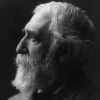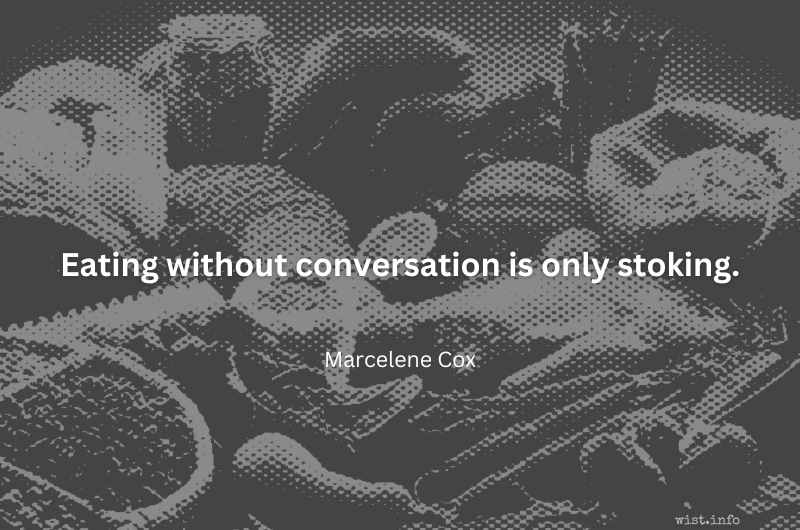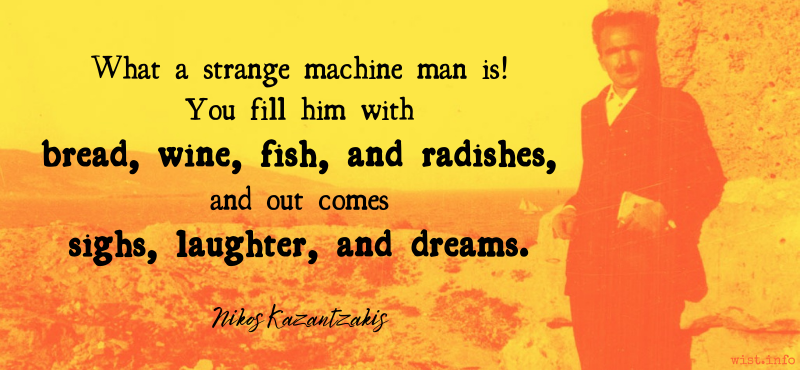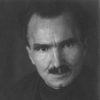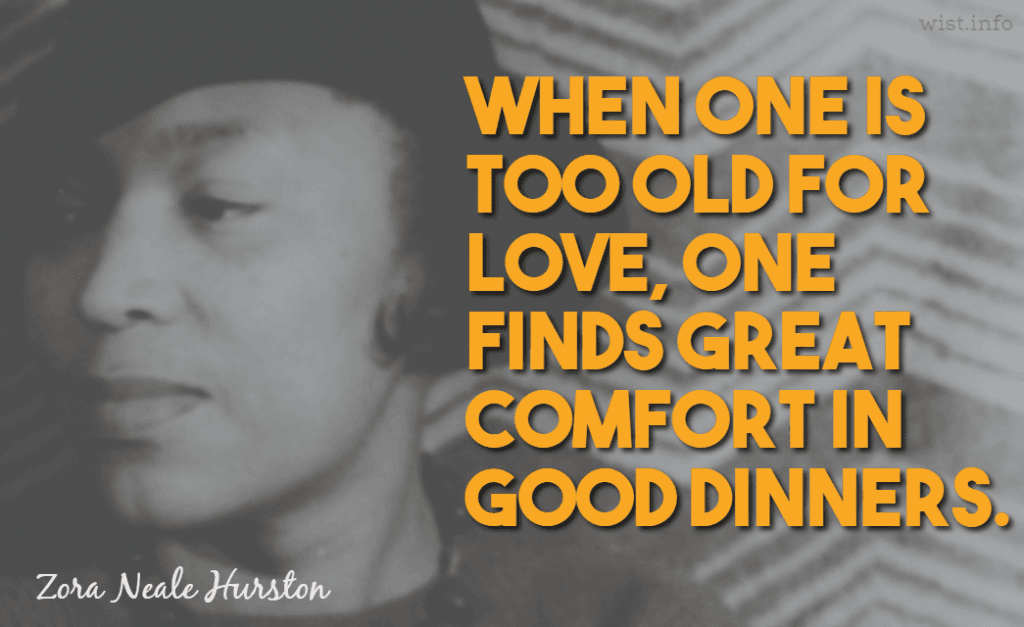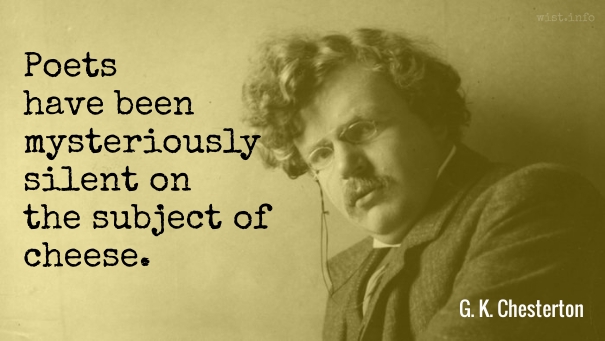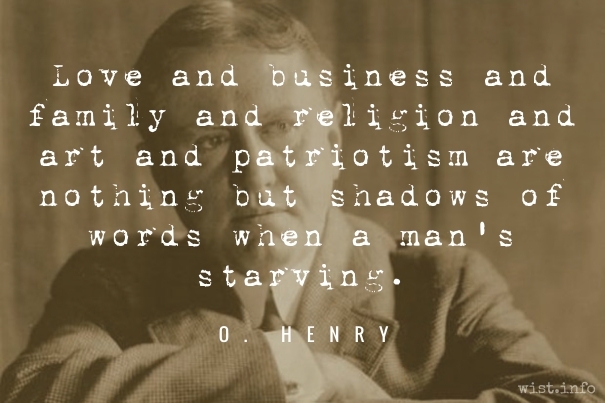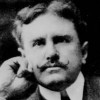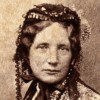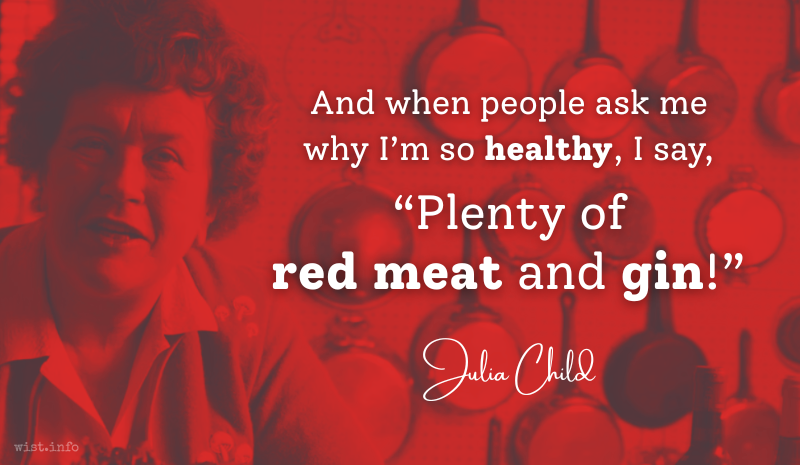You know how interesting the purchase of a sponge-cake is to me.
Jane Austen (1775-1817) English author
Letter (1808-06-15) to Cassandra Austen
(Source)
First recorded use of the term "sponge-cake" in English.
Quotations about:
food
Note not all quotations have been tagged, so Search may find additional quotes on this topic.
I can recollect nothing more to say at present; perhaps breakfast may assist my ideas.
I was deceived — my breakfast supplied only two ideas — that the rolls were good and the butter bad.
Be temperate in wine, in eating, girls, and sloth;
Or the Gout will seize you and plague you both.Benjamin Franklin (1706-1790) American statesman, scientist, philosopher, aphorist
Poor Richard (1734 ed.)
(Source)
“Nearly eleven o’clock,” said Pooh happily. “You’re just in time for a little smackerel of something.”
A. A. Milne (1882-1956) English poet and playwright [Alan Alexander Milne]
House at Pooh Corner, ch. 1 (1928)
(Source)
How little it takes to make life perfect! A good sauce, a cocktail after a hard day, a girl who kisses with her mouth half open!
H. L. Mencken (1880-1956) American writer and journalist [Henry Lewis Mencken]
A Little Book in C Major, ch. 4, § 21 (1916)
(Source)
The way to a man’s heart is through his stomach, especially if you tell him how flat it is.
Mignon McLaughlin (1913-1983) American journalist and author
The Second Neurotic’s Notebook, ch. 3 (1966)
(Source)
Lettuce is like conversation: it must be fresh and crisp, and so sparkling that you scarcely notice the bitter in it.
Charles Dudley Warner (1829–1900) American essayist and novelist
My Summer in a Garden, “Ninth Week” (1871)
(Source)
Moderation. Small helpings. Sample a little bit of everything. These are the secrets of happiness and good health. You need to enjoy the good things in life, but you need not overindulge.
Julia Child (1912-2004) American chef and writer
“What I’ve Learned,” interview by MIke Sager, Esquire (2001-06)
(Source)
Eating without conversation is only stoking.
Marcelene Cox (1900-1998) American writer, columnist, aphorist
“Ask Any Woman” column, Ladies’ Home Journal (1943-06)
(Source)
The pleasures of the table — that lovely old-fashioned phrase — depict food as an art form, as a delightful part of civilized life. In spite of food fads, fitness programs, and health concerns, we must never lose sight of a beautifully conceived meal.
French food, by the way, isn’t fancy unless, like other cooking, it wants to be fancy; perhaps it sounds so because it is in a foreign language, but a Coq au Vin is a chicken stew, a Pot-au-feu is a boiled dinner, a Mayonnaise de Volaille is a chicken salad, Soubise is plain old rice cooked with onions, and there is nothing fancy about any of them.
Julia Child (1912-2004) American chef and writer
Julia Child’s Kitchen, Introduction (1975)
(Source)
Learn how to cook! That’s my invariable answer when I am asked to give forth with money-saving recipes, economy tips, budget gourmet dinner menus for six people under ten dollars, and the like. Learn how to cook! That’s the way to save money. You don’t save it buying hamburger helpers, and prepared foods; you save it buying fresh foods in season or in large supply, when they are cheapest and usually best, and you prepare them from scratch at home. Why pay for someone else’s work, when if you know how to do it, you can save all that money for yourself? Knowing how to do it also means doing it fast, and preparing parts of a dish or a meal whenever you have a spare moment in the kitchen. That way, cooking well doesn’t take a great deal of time, and when you cook well, you’ll be eating far better meals than you could buy from the freezer, or at a restaurant.
Julia Child (1912-2004) American chef and writer
Julia Child’s Kitchen, Introduction (1975)
(Source)
“Too much trouble,” “Too expensive,” or “Who will know the difference” are death knells for good food.
Julia Child (1912-2004) American chef and writer
Mastering the Art of French Cooking, Foreword (1961)
(Source)
Hunger never saw bad bread.
Benjamin Franklin (1706-1790) American statesman, scientist, philosopher, aphorist
Poor Richard (1733)
(Source)
So, what’s it like in the real world? Well, the food is better, but beyond that, I don’t recommend it.
Bill Watterson (b. 1958) American cartoonist
Commencement Address, Kenyon College (20 May 1990)
(Source)
I have often wondered what turkeys would think of Christmas if they were capable of thought. I am afraid they would hardly regard it as a season of peace and goodwill.
Bertrand Russell (1872-1970) English mathematician and philosopher
“If animals could talk,” New York American (1932-09-14)
(Source)
I’m awfully sorry for people who are taken in by all of today’s dietary mumbo jumbo. They are not getting any enjoyment out of their food.
Sharing the food is to me more important than arguing about beliefs. Jesus, according to the gospels, thought so too.
Freeman Dyson (1923-2020) English-American theoretical physicist, mathematician, futurist
“Progress in Religion,” Templeton Prize acceptance speech, Washington National Cathedral (9 May 2000)
(Source)
Reader and hearer, Aulus, love my stuff;
A certain poet says it’s rather rough.
Well, I don’t care. For dinners or for books
The guest’s opinion matters, not the cook’s.[Lector et auditor nostros probat, Aule, libellos,
Sed quidam exactos esse poeta negat.
Non nimium curo: nam cenae fercula nostrae
Malim convivis quam placuisse cocis.]Martial (AD c.39-c.103) Spanish Roman poet, satirist, epigrammatist [Marcus Valerius Martialis]
Epigrams [Epigrammata], Book 9, epigram 81 (9.81) (AD 94) [tr. Francis & Tatum (1924)]
(Source)
"To Aulus". The numbering for this epigram varies between 81, 82, and 83 within in Book 9. (Source (Latin)). Alternate translations:
The readers and the hearers like my books,
And, yet, some writers cannot them digest:
But what care I? for when I make a feast,
I would my guests should praise it, not the cooks.
[tr. Harington (16th C)]
Readers and hearers, both my Bookes renowne;
Some Poets say th' are not exactly done.
I care not much; like banquets, let my Bookes
Rather be pleasing to the guests than Cookes.
[tr. May (1629), 9.82]
My works the reader and the hearer praise:
They're not exact; a brother poet says:
I heed not him; for when I give a feast,
Am I to please the cook, or please the guest?
[tr. Hay (1755), ep. 82]
The reader and the hearer like my lays.
But they're unfinisht things, a poet says.
The stricture ne'er shall discompose my looke:
My chear is for my guests, and not for cooks.
[tr. Elphinston (1782), 3.14]
My works the reader and the hearer praise; --
They're incorrect, a brother poet says:
But let him rail; for when I give a feast,
Am I to praise the cook, or please the guest?
[tr. Hoadley (fl. 18th C), 9.82, §255]
The reader and the hearer approve of my small books, but a certain critic objects that they are not finished to a nicety. I do not take this censure much to heart, for I would wish that the course of my dinner should afford pleasure to guests rather than to cooks.
[tr. Amos (1858) 2.24]
My readers and hearers, Aulus, approve of my compositions; but a certain critic says that they are not faultless. I am not much concerned at his censure; for I should wish the dishes on my table to please guests rather than cooks.
[tr. Bohn's Classical (1859)]
Reader and hearer both my verses praise:
Some other poet cries, "They do not scan."
But what care I? my dinner's always served
To please my guests, and not to please the cooks.
[ed. Harbottle (1897)]
Though my readers sincerely admire me,
A poet finds fault with my books.
What's the odds? When I'm giving a dinner
I'd rather please guests than the cooks.
[tr. Nixon (1911)]
Reader and hearer approve of my works, Aulus, but a certain poet says they are not polished. I don't care much, for I should prefer the courses of my dinner to please guests rather than cooks.
[tr. Ker (1919)]
"Unpolished" -- so that scribbler sneers,
While he that reads and he that hears,
Approve my little books;
I do not care a single jot,
My fame is for my guests and not
To please my rival cooks.
[tr. Pott & Wright (1921)]
The public likes my poems, though
A certain poet thinks them rough
Or never polished quite enough.
I could not care less! I prefer
The morsels served up in my books
To please my guests, not would-be cooks.
[tr. Marcellino (1968)]
Readers and listeners like my books,
Yet a certain poet calls them crude.
What do I care? I serve up food
To please my guests, not fellow cooks.
[tr. Michie (1972)]
Everyone enjoys my delightful books
Except a certain poet who objects.
I aim to please my guests, not other cooks.
[tr. O'Connell (1991)]
Reader and listener approve my little books, Aulus, but a certain poet says they lack finish. I don't care too much; for I had rather the courses at my dinner pleased the diners than the cooks.
[tr. Shackleton Bailey (1993)]
Read or recited, my verse is much praised,
Aulus, yet one poet opines: "Ill-phrased."
I couldn't care less! When I set a table,
My guests, not the cooks, should say I'm able.
[tr. Schmidgall (2001)]
My books are praised by him who reads,
Though critics damn them in their screeds.
But who's to judge a proper meat --
Another cook, or those who eat?
[tr. Wills (2007), ep. 83]
Shake and shake
The catsup bottle,
None will come,
And then a lot’ll.
Before a Cat will condescend
To treat you as a trusted friend,
Some little token of esteem
Is needed, like a dish of cream.T. S. Eliot (1888-1965) American-British poet, critic, playwright [Thomas Stearns Eliot]
Old Possum’s Book of Practical Cats, “The Ad-dressing of Cats” (1939)
(Source)
He’d noticed that sex bore some resemblance to cookery: it fascinated people, they sometimes bought books full of complicated recipes and interesting pictures, and sometimes when they were really hungry they created vast banquets in their imagination — but at the end of the day they’d settle quite happily for egg and chips. If it was well done and maybe had a slice of tomato.
It was only when the whole ham was spoiled that it came into the department of Elzbieta. Cut up by the two-thousand-revolutions-a-minute flyers, and mixed with half a ton of other meat, no odor that ever was in a ham could make any difference. There was never the least attention paid to what was cut up for sausage; there would come all the way back from Europe old sausage that had been rejected, and that was moldy and white — it would be dosed with borax and glycerine, and dumped into the hoppers, and made over again for home consumption. There would be meat that had tumbled out on the floor, in the dirt and sawdust, where the workers had tramped and spit uncounted billions of consumption germs. There would be meat stored in great piles in rooms; and the water from leaky roofs would drip over it, and thousands of rats would race about on it. It was too dark in these storage places to see well, but a man could run his hand over these piles of meat and sweep off handfuls of the dried dung of rats. These rats were nuisances, and the packers would put poisoned bread out for them; they would die, and then rats, bread, and meat would go into the hoppers together. This is no fairy story and no joke; the meat would be shoveled into carts, and the man who did the shoveling would not trouble to lift out a rat even when he saw one — there were things that went into the sausage in comparison with which a poisoned rat was a tidbit. There was no place for the men to wash their hands before they ate their dinner, and so they made a practice of washing them in the water that was to be ladled into the sausage. There were the butt-ends of smoked meat, and the scraps of corned beef, and all the odds and ends of the waste of the plants, that would be dumped into old barrels in the cellar and left there. Under the system of rigid economy which the packers enforced, there were some jobs that it only paid to do once in a long time, and among these was the cleaning out of the waste barrels. Every spring they did it; and in the barrels would be dirt and rust and old nails and stale water — and cartload after cartload of it would be taken up and dumped into the hoppers with fresh meat, and sent out to the public’s breakfast. Some of it they would make into “smoked” sausage but as the smoking took time, and was therefore expensive, they would call upon their chemistry department, and preserve it with borax and color it with gelatine to make it brown. All of their sausage came out of the same bowl, but when they came to wrap it they would stamp some of it “special,” and for this they would charge two cents more a pound.
Upton Sinclair (1878-1968) American writer, journalist, activist, politician
The Jungle, ch. 14 (1906)
(Source)
The power of bacon seems to know no bounds. It’s not just the taste, which is like eating pure joy. The frying of bacon even sounds like applause.
Jim Gaffigan (b. 1966) American comedian, actor, writer, producer.
Food: A Love Story, “Bacon: The Candy of Meat” (2014)
(Source)
Bacon is so good by itself that to put it in any other food is an admission of failure. You’re basically saying, “I can’t make this other food taste good, so I’ll throw in bacon.”
Penn Jillette (b. 1955) American stage magician, actor, musician, author
Quoted in Adam Boult, “Why We Love Eating Meat,” Telegraph (13 Jun 2016)
(Source)
You have just dined, and however scrupulously the slaughterhouse is concealed in the graceful distance of miles, there is complicity ….
Ralph Waldo Emerson (1803-1882) American essayist, lecturer, poet
“Fate,” The Conduct of Life, ch. 1 (1860)
(Source)
My definition of Man is “a Cooking animal.” The beasts have memory, judgment, and all the faculties and passions of our mind, in a certain degree; but no beast is a cook. … Man alone can dress a good dish; and every man whatever is more or less a cook, in seasoning what he himself eats.
James Boswell (1740-1795) Scottish biographer, diarist, lawyer
The Journal of a Tour to the Hebrides with Samuel Johnson, Sunday, 15 Aug, footnote (1785)
(Source)
Unlike most quoted Boswell, this is his own thought, not that of Samuel Johnson, recounting a conversation he had with Edmund Burke.
When one is too old for love, one finds great comfort in good dinners.
Zora Neale Hurston (1891-1960) American writer, folklorist, anthropologist
Moses, Man of the Mountain, ch. 6 [Mentu] (1939)
(Source)
No cook can ignore the opinion of a man who asks for three helpings. One is politeness, two is hunger, but three is a true and cherished compliment.
But man is a carnivorous production,
And must have meals, at least one meal a day;
He cannot live, like woodcocks, upon suction,
But, like the shark and tiger, must have prey;
Although his anatomical construction
Bears vegetables, in a grumbling way,
Your labouring people think beyond all question,
Beef, veal, and mutton, better for digestion.
A good martini, a good meal, a good cigar and a good woman … or a bad woman, depending on how much happiness you can stand.
George Burns (1896-1996) American comedian
Dr. Burns’ Prescription for Happiness, “Nine Definitions of Happiness” (1984)
(Source)
The human frame being what it is, heart, body and brain all mixed together, and not contained in separate compartments as they will be no doubt in another million years, a good dinner is of great importance to good talk. One cannot think well, love well, sleep well, if one has not dined well.
TANNER: Of all human struggles there is none so treacherous and remorseless as the struggle between the artist man and the mother woman. Which shall use up the other? That is the issue between them. And it is all the deadlier because, in your romanticist cant, they love one another.
OCTAVIUS: Even if it were so — and I don’t admit it for a moment — it is out of the deadliest struggles that we get the noblest characters.
TANNER: Remember that the next time you meet a grizzly bear or a Bengal tiger, Tavy.
OCTAVIUS: I meant where there is love, Jack.
TANNER: Oh, the tiger will love you. There is no love sincerer than the love of food. I think Ann loves you that way: she patted your cheek as if it were a nicely underdone chop.George Bernard Shaw (1856-1950) British playwright and critic
Man and Superman, Act 1, l. 184-188 (1903)
(Source)
Often just the "There is no love sincerer than the love of food" portion is quoted.
If you like Anglo-Saxon, I belched. If you fancy Latin, I eructed. No matter which, I had known that Wolfe and Inspector Cramer would have to put up with it that evening, because that is always a part of my reaction to sauerkraut. I don’t glory in it or go for a record, but neither do I fight it back. I want to be liked just for myself.
In lecturing on cookery, as on housebuilding, I divide the subject into, not four, but five grand elements: first, Bread; second, Butter; third, Meat; fourth, Vegetables; and fifth, Tea — by which I mean, generically, all sorts of warm, comfortable drinks served out in teacups, whether they be called tea, coffee, chocolate, broma, or what not. I affirm that, if these five departments are all perfect, the great ends of domestic cookery are answered, so far as the comfort and well-being of life are concerned.
The only time to eat diet food is while you’re waiting for the steak to cook.
Julia Child (1912-2004) American chef and writer
Quoted in Nancy Verde Barr, Backstage with Julia, ch. 3 (2007)
(Source)
And when people ask me why I’m so healthy, I say, “Plenty of red meat and gin!”
Julia Child (1912-2004) American chef and writer
Interview in The World: Journal of the Unitarian Universalist Assoc. (1992)
(Source)
On her 80th birthday. "Red meat and gin" was frequently mentioned by Child in interviews when asked either (a) her comfort foods or (b) the secret of her longevity. She does not seem to have used it in her writing.
Examples:
- Long life: Interview with Rena Pederson
- Long life: Quoted in the Minneapolis Star Tribune, requoted in Reader's Digest (1997-01)
- Confort food: Source
“Familiarity breeds kontempt.” This only applies tew men, not tew hot bukwheat slapkakes, well buttered and sugared.
[“Familiarity breeds contempt.” This only applies to men, not to hot buckwheat slapcakes, well buttered and sugared.]
Josh Billings (1818-1885) American humorist, aphorist [pseud. of Henry Wheeler Shaw]
Josh Billings: His Works, Complete (1873)
See Apuleius.
There is more in you of good than you know, child of the kindly West. Some courage and some wisdom, blended in measure. If more of us valued food and cheer and song above hoarded gold, it would be a merrier world.
J.R.R. Tolkien (1892-1973) English writer, fabulist, philologist, academic [John Ronald Reuel Tolkien]
The Hobbit, ch. 18 “The Return Journey” [Thorin] (1937)
(Source)
And he gave it for his opinion, that whosoever could make two ears of corn or two blades of grass to grow upon a spot of ground where only one grew before, would deserve better of mankind, and do more essential service to his country, than the whole race of politicians put together.
Even while I protest the assembly-line production of our food, our songs, our language, and eventually our souls, I know that it was a rare home that baked good bread in the old days. Mother’s cooking was with rare exceptions poor, that good unpasteurized milk touched only by flies and bits of manure crawled with bacteria, the healthy old-time life was riddled with aches, sudden death from unknown causes, and that sweet local speech I mourn was the child of illiteracy and ignorance. It is the nature of a man as he grows older, a small bridge in time, to protest against change, particularly change for the better.
John Steinbeck (1902-1968) American writer
Travels With Charley: In Search of America, Part 2 (1962)
(Source)
I believe in the gospel of Good Living. You can not make any god happy by fasting. Let us have good food, and let us have it well cooked — and it is a thousand times better to know how to cook than it is to understand any theology in the world.
Robert Green Ingersoll (1833-1899) American lawyer, agnostic, orator
“What Must We Do to Be Saved?” Sec. 11 (1880)
(Source)
Serenely full, the epicure would say,
Fate cannot harm me, I have dined to-day.Sydney Smith (1771-1845) English clergyman, essayist, wit
Memoir of the Reverend Sydney Smith, by His Daughter, Lady Holland, Vol. 1, ch. 11 (1855)
(Source)
At the end of a recipe for highly praised potato salad dressing.
MACHEATH: You may proclaim, good sirs, your fine philosophy
But till you feed us, right and wrong can wait![Erst kommt das Fressen, dann kommt die Moral.]
Bertolt Brecht (1898-1956) German poet, playwright, director, dramaturgist
Die Dreigroschenoper [The Three-Penny Opera], Act 2, sc. 3 (1928)
Alt. trans.:
- However much you twist, whatever lies you tell / Food is the first thing, morals follow on." [used by the Pet Shop Boys, "What Keeps Mankind Alive?", Can You Forgive Her (1993)
- Food first, then morality.
- Food comes first, then morals.
- First comes a full stomach, then comes ethics.
Why should my freedom be governed by somebody else’s conscience?
The Bible (The New Testament) (AD 1st - 2nd C) Christian sacred scripture
1 Corinthians 10:29 [NJB (1985)]
(Source)
Paul on how it's okay to eat food that others think is religiously wrong to eat (but how you shouldn't be a dick about it, either).
Alternate translations:
For why is my liberty judged of another man's conscience?
[KJV (1611)]
Why should my freedom depend on somebody else’s conscience?
[JB (1966)]
“Well, then,” someone asks, “why should my freedom to act be limited by another person's conscience?"
[GNT (1976)]
Why should my freedom be judged by someone else’s conscience?
[CEB (2011)]
For why should my liberty be subject to the judgment of someone else’s conscience?
[NRSV (2021 ed.)]






